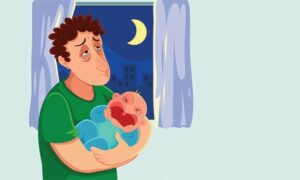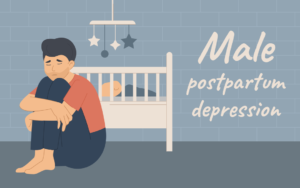Postpartum depression (PPD) is a serious mental health condition that can affect both mothers and fathers. According to the National Institutes of Health, PPD occurs in about one in every five new mothers, and it’s thought to be more common in men than in women. PPD can severely impair a person’s ability to care for themselves and their baby, and can even lead to suicide. If you or someone you know is struggling with PPD, there are ways to get help. Read this blog post to know all the basics about postpartum depression in men.
Contents
What is Postpartum Depression In Men?

Postpartum depression is a mood disorder that affects women after they have a baby. It can be serious and interfere with a woman’s ability to care for her child. Symptoms can include feelings of sadness, loneliness, and emptiness. Postpartum depression usually goes away within six months after the baby is born.
In men, general postpartum depression is diagnosed when there are symptoms that last for more than two weeks. Symptoms may include feelings of sadness, hopelessness, and irritability. Men with postpartum depression may also have problems sleeping, losing weight, or having thoughts about suicide. Treatment for postpartum depression in men typically includes medication and counseling.
Generally in men, postpartum depression is less common than in women. However, it’s important to talk to your doctor if you have any signs or symptoms of postpartum depression in men.
Signs and Symptoms of Postpartum Depression in Men
Postpartum depression is a serious mental health condition that affects both mothers and fathers. It’s characterized by a range of symptoms, including sadness, hopelessness, fatigue, difficulty concentrating, irritability, and mood swings. In men, postpartum depression can be particularly challenging to diagnose because it often doesn’t present with typical signs and symptoms.
These are some of the signs of postpartum depression in men:
Feeling Irritable: One of the most common symptoms of postpartum depression is irritability. Fathers may become short-tempered, angry, or aggressive with their children and spouses. They also may have difficulty controlling their emotions.
Loss of Interest in Activities: Fathers may experience a loss of interest in activities they used to enjoy, such as spending time with friends or participating in hobbies.
Changes in Sleep Patterns: Fathers may find it difficult to get enough sleep, which can lead to fatigue and decreased focus.
Weight Gain or Weight Loss: Fathers may experience changes in their weight, either gaining or losing weight without any obvious reason.
Changes in Mood: Fathers who are struggling with postpartum depression may have a decreased sense of happiness and joy. They may also experience feelings of isolation and loneliness.
If you’re experiencing any of these signs of postpartum depression in men, it’s important to get help. Talk to your doctor or therapist about your symptoms and how they’re impacting your life.
Reasons For Postpartum Depression in Men

Causes of postpartum depression in men can be many and varied, but may include:
-Anxiety or stress caused by new responsibilities as a father or husband: One of the main stresses of becoming a father or husband is often the sudden change in responsibility. This can be overwhelming for some fathers, leading to feelings of anxiety and stress which can then lead to postpartum depression.
-Genetics: Studies have shown that there is a genetic component to postpartum depression, with fathers more likely to experience the condition than mothers. This may be due to variations in certain neurotransmitters such as serotonin, which may play a role in mood regulation.
-Changes in hormone levels: Changes in hormone levels after giving birth can play a role in causing postpartum depression. Hormone fluctuations can lead to feelings of sadness, fatigue, and emotional detachment.
-Experiencing mental health issues before becoming a parent: Some fathers may experience mental health issues such as anxiety or depression before becoming fathers, which can then lead to postpartum depression.
– Relationship problems with wife or partner: If the father experiences problems with his wife or partner during or after the birth, this may lead to a feeling of isolation and loneliness which can then lead to postpartum depression.
Is Postpartum Depression in Men Common?
Postpartum depression is a serious mental illness that affects both mothers and fathers. However, the condition is more commonly diagnosed in mothers. Although postpartum depression in men is not as well-known as postpartum depression in women, it is still a problem.
Most postpartum depression cases start within the first few weeks after birth. It’s important to get help as soon as you feel like you’re having a low mood or are having problems with your emotions. If left untreated, postpartum depression can lead to major problems, including:
Poor relationships with family and friends: Sometimes people with postpartum depression feel isolated and disconnected from others.
Trouble sleeping: Many fathers experience significant changes in sleep patterns after giving birth. If you’re struggling to get enough sleep, this can further contribute to your feelings of sadness and anxiety. Men with postpartum depression often have a lot of intense emotions, including sadness, anger, and frustration.
Increased alcohol or drug use: Fathers who are struggling with postpartum depression may seek out substances to help them cope with their feelings. This can lead to problems with addiction in the long run.
Postpartum Depression in Men: When to See a Doctor

Visiting a doctor in the postpartum period is a good idea for men who are experiencing signs and symptoms of depression, such as feeling a lack of pleasure in activities that used to be enjoyable, insomnia or hypersomnia, feeling agitated or hopeless, weight gain or loss, difficulty concentrating or making decisions, feelings of guilt or worthlessness.
You should visit a doctor if you have been experiencing these symptoms for two weeks or more, and they are severe enough to interfere with your daily life.
To visit a doctor, be sure to talk to your partner or family members about your feelings and concerns, and see if they can refer you to a specialist.
There are some steps to diagnose postpartum depression in men, including a psychiatric evaluation and a physical exam. Some of these also include blood tests to check for signs of liver or thyroid problems.
Treatment Options for Postpartum Depression in Men
Postpartum depression affects both mothers and fathers, but it is more common in mothers. Symptoms can include severe sadness, anxiety, irritability, sleep problems, weight gain or loss, and difficulty concentrating or thinking. There is no one cause of postpartum depression, but it may be caused by hormones and stress hormones released during childbirth. Treatment options for postpartum depression in men include medication, therapy, and self-help techniques.
Medication is the most common treatment for postpartum depression in women. The most common antidepressants used to treat postpartum depression are SSRIs (selective serotonin reuptake inhibitors). Other medications that are effective in treating postpartum depression are tricyclic antidepressants and monoamine oxidase inhibitors (MAOIs).
If a father does not respond to medication, therapy may be recommended. Therapists may treat postpartum depression with cognitive-behavioral therapy (CBT), interpersonal therapy (IPT), or supported decision-making therapy (SDM). CBT focuses on changing the way a person thinks about their symptoms and behaviors. ITP helps couples learn how to communicate better and deal with conflicts. SDM provides family members with tools to make decisions about care for their loved ones with postpartum depression.
Self-help techniques may also be useful in treating postpartum depression in men. These techniques include exercise, relaxation exercises, and stress management techniques.
It is important to remember that not all fathers with postpartum depression will experience the same symptoms. It is important to speak with a doctor or therapist about your symptoms and how best to treat them.
Conclusion
For men, postpartum depression can be just as debilitating as it is for women. In fact, according to the National Institutes of Mental Health (NIMH), it is now recognized as a major public health problem that affects both mothers and fathers. The good news is that there are ways to cope with postpartum depression, whether you are the father of a newborn or not. If you or someone you know is struggling with postpartum depression, don’t hesitate to reach out for help. There are plenty of resources available online and through mental health professionals in your area.
Hope this article was of help to you! If you are suffering from mental health disorders, you may seek help from Therapy Mantra. We have a team of highly trained and experienced therapists who can provide you with the tools and skills necessary for overcoming mental health disorders. Contact us today to schedule an online therapy or download our free Android or iOS app for more information.


